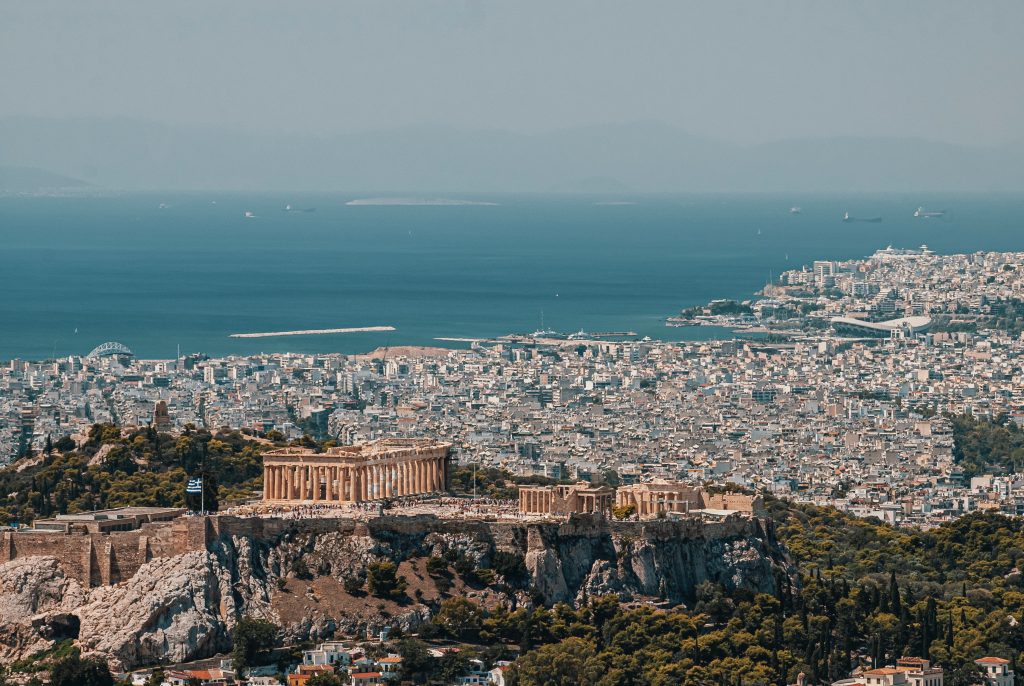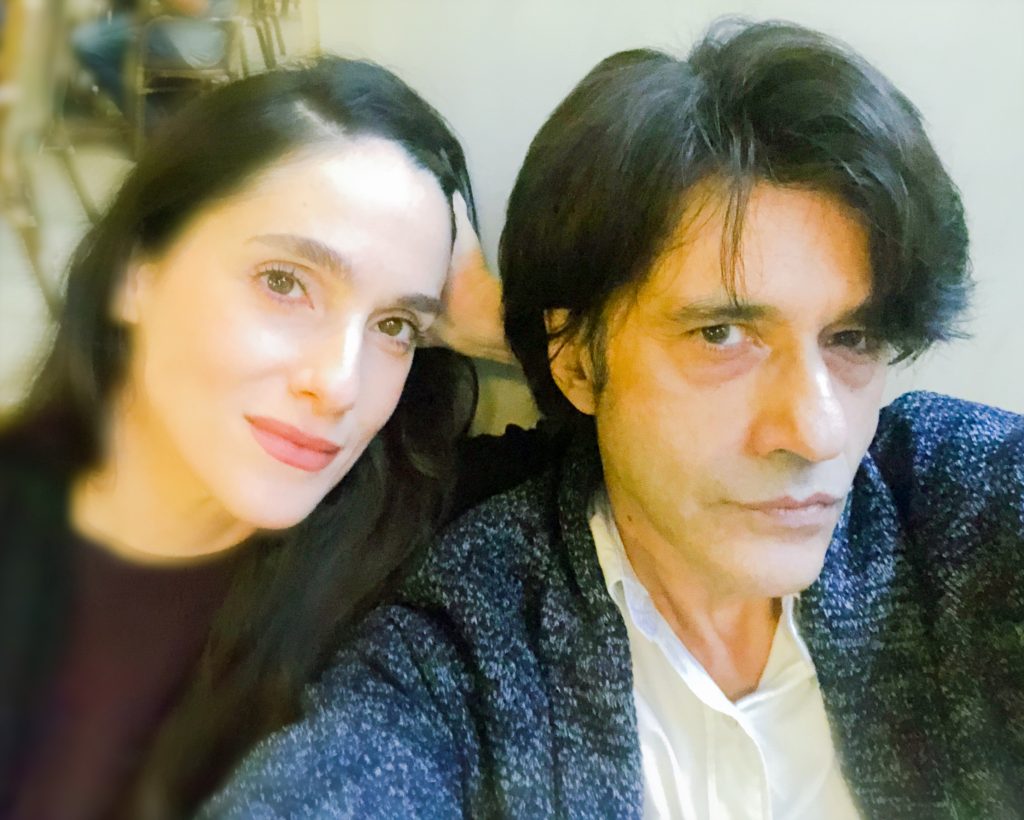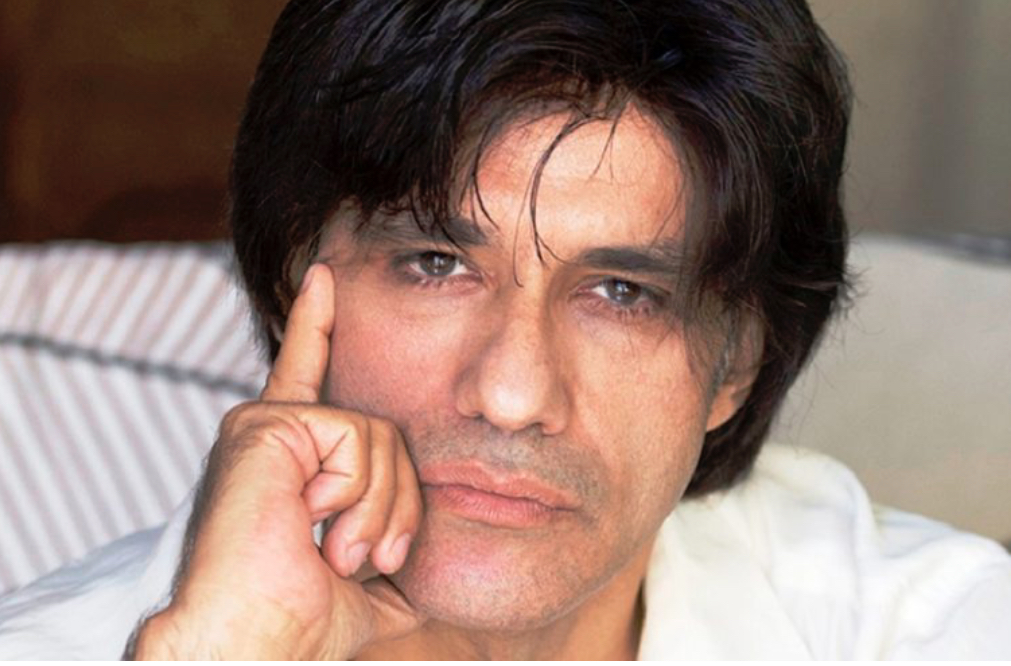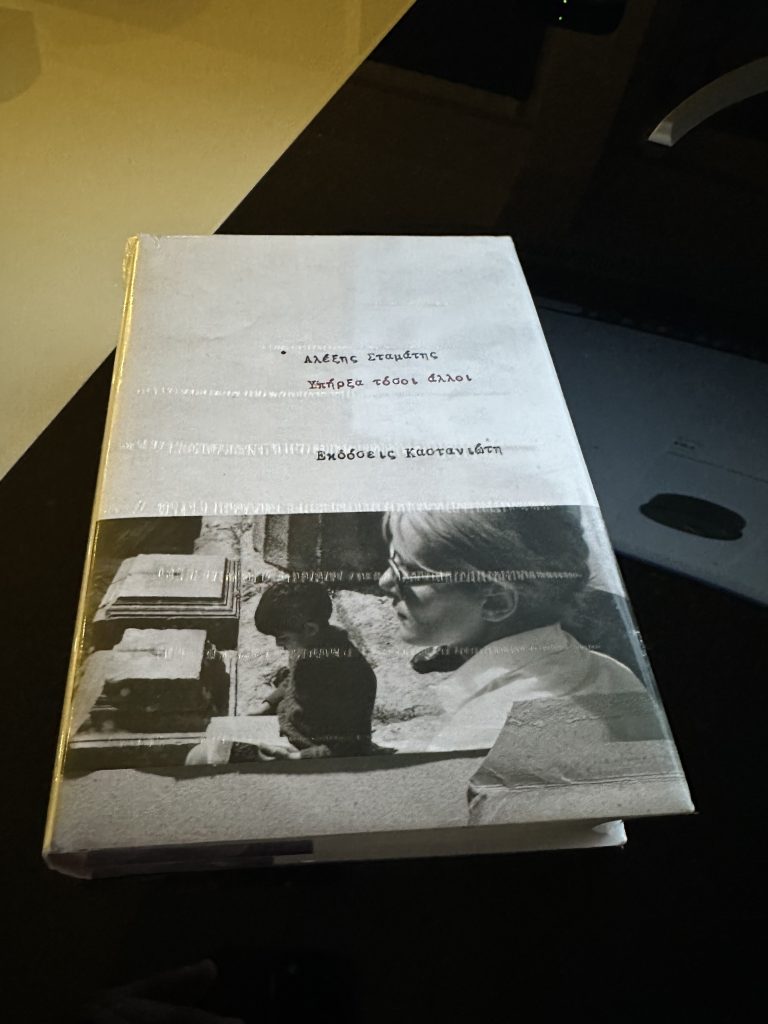Stamatis: We Still Don’t Feel Like Citizens
-Certainly, the mindset and character of a city are intertwined, akin to performing in a personal theater daily, with the city as the stage. Unfortunately, this understanding is often overlooked. When we shut our doors, everything beyond becomes an indistinct “outside,” contrasting with the inside, which we deem our personal space. Cultivating awareness of our existence within the wider sphere is essential, states Alexis Stamatis, a renowned Greek author, for the euPOLIS.
His new book “I Have Been So Many Others”, released by Kastaniotis Publishing is a unique approach to the (self)portrait narrative of both the author and Athens, the city he was born and lives in. Being an architect by education, he often gives different urban settings a delicate role of a quiet but impactful character. In this conversation, Stamatis gives us his distinctive and intimate view of Athens.
In your new book, you refer to Pericles Gianopulos saying that “Life in Greece is lived outside” in tavernas, cafes… Does Athens seem equally welcoming to that kind of life nowadays compared to those romantic, post-junta times that marked your life at the University?
I orchestrated a walking presentation commencing at NTUA (National Technical University of Athens), situated in the renowned Exarcheia district of Athens. During the post-junta era, Exarcheia was a hub of diverse experiences—both positive and negative—teeming with life, intellectuals, and discussions around novel political ideas. Recalling my school days, after lessons, we’d head to tavernas, not bars, fostering an unstructured yet authentic atmosphere. Today, with a metro station in place, it has transformed from a meeting point to a melting pot, echoing the fate of many metropolises. The pluralistic life seems diminished, as people now work and stay at home, impacting the vibrant rhythm of life that I, as a writer, miss. Despite being conducive for solitary work, the shift is evident, especially among the younger generation frequenting noisy bars with numerous distractions like smartphones.
Athens, chosen by the Ancient Greeks for its superb setting, is easily accessible from the Acropolis to the sea within thirty minutes via expansive avenues. However, contemporary Athens is witnessing the rise of towering structures, prioritizing commercial activities over fostering meaningful designs and connections.
The city’s diversity is notable; each corner offers a distinct spatial temperature. This juxtaposition, a unique characteristic not found in meticulously planned cities like Paris, reflects Athens’ gradual, day-by-day development. Presently, efforts are underway to adapt and enhance this given characteristic, acknowledging the prevailing lifestyle that draws people outside for nine months of the year.
Photos: Stamatis, Private Archive
And can we acknowledge some obvious changes in architecture and urbanism in those days that followed such huge social changes? (As an example, in ex-Yugoslavia, after the Second World War, the so-called brutalism emerged in architecture, but also, massive housing conglomerates with dedicated public parts, built in the belief that everyone would naturally take care of them just because everyone needed those common places).
Similar circumstances unfolded here, predating the junta, as a surge of migrants sought living space in a city already limited in capacity. The result was the construction of “πολυκατοικία‘‘– multi-story apartment buildings, a distinct departure from the labor-house structures in England or Eastern Berlin. Despite the architectural intrigue, I couldn’t fathom residing in such spaces. This misinterpretation of Le Corbusier’s philosophy – “High-rise, low density” – led to an unintended consequence. While aiming for green spaces on higher levels, the result was cramped living, backfiring in a unique way. This aspect, among others, made me abandon architecture. Legislation compounded the issue by restricting balconies to a mere 1.4 meters, an impractical constraint for a country enjoying around 80% sunny days annually. The stringent law birthed the ubiquitous “beton arme” (reinforced concrete) multi-story buildings, constituting nearly 70% of the city. While they lack uniform height and exterior, courtesy of private architects rather than state design, their overall aesthetics remain unsightly and monotonous.
But what does that do to a person’s mind, and well-being, to reduce its life to a shoebox with no balcony, no way to have an open sky above them?
As I said, this is why I dropped architecture. For me, architecture was a discipline of philosophy and art. It was about creating and giving back, and when I realized I had to work in a very overregulated atmosphere: this room can only be like this, the kitchen can only be like that… I dropped out. How would this preconceived structure reflect any user’s character and be in dialogue with any other surrounding structure? You don’t just put things here and there and call it architecture. A city is a living organism, you are not building it from scratch, there is a past, and there is a historical path you have to follow. Yes, cities can change drastically, more or less successfully, and that is okay. But here in the Balkans, we have a problem and it is only becoming worse with the growing impacts of climate change.
In “Bar Flaubert”, Ioannis contemplates the purpose of architecture and concludes that our dissatisfaction with our cities comes from the fact that we are not satisfied with the societies living in and making those cities. Can we rely on trends in architecture and urbanism to be indicators for significant notions and trends in social behavior and changing values? And if we look at nowadays’ Athens or Belgrade, or Berlin…?
Certainly, the mindset and character of a city are intertwined, akin to performing in a personal theater daily, with the city as the stage. Unfortunately, this understanding is often overlooked. When we shut our doors, everything beyond becomes an indistinct “outside,” contrasting with the inside, which we deem our personal space. Cultivating awareness of our existence within the wider sphere is essential. Often, our perspective is confined within our four walls, a mindset influenced by both culture and education. Encouragingly, these concepts are progressively finding a place in educational agendas, fostering a broader perspective.
Do you feel that the Athenians love Athens and that they are proud of their city today?
No! Because they are not able to detach themselves from the everyday life. I always do this trick: I go to Athens downtown and I say to myself, now I am a tourist, a stranger, I am from Serbia and what is it that I can see? Because, when I go to Serbia, I look and I am a flâneur, I see things differently than you. There, I do perceive this differentiation of smells, and images, and I create a personal narrative. People take the city for granted, something to be used as their garage. No one is looking but the tourists, and tourists see what is selected for them to see.
Photo: Unsplash

And how do you find nowadays Athens?
Presently, residing in the northern part of the city grants me the fortune of experiencing temperatures approximately five degrees lower than Athens’s average. Reflecting on life before the era of air conditioning, it felt akin to Dante’s depiction of hell!
Around 1985, during post-graduate studies on energy architecture, we delved into constructing energy-efficient structures. Even then, foresight warned of impending challenges, advocating for eco-friendly buildings and neighborhoods. However, this isn’t merely a choice for architects; legislation must mandate it. Unfortunately, comprehensive and obligatory measures are yet to be implemented.
Despite the ubiquitous discourse on climate change in political agendas, environmental awareness here remains relatively weak. The sense of citizenship is lacking; people don’t perceive their roles, rights, and obligations. Ensuring a sustainable climate and city is our entitlement.
Traditionally, we deemed certain resources like water and air to be perpetually free. However, contemplating the future, it’s uncertain whether these will remain universally accessible. Though it might sound like a sci-fi scenario, it’s a potential reality.
It is said that social revolutions knock at our doors when common people start demanding the prerogatives so far preserved for the elites. Recently, you debated the aspirations of today’s elites, whether all earthly resources have been depleted, and whether the lives of privileged individuals will continue by colonizing the Moon or Mars. Who are our pioneers of social progression and what values do they represent?
The indifference of these elites towards ordinary people is evident; their concern lies in the hype and its impact on shares. People have become tools for the grandiose ideas of a few billionaires. While billionaires in the past contributed to society by building hospitals and supporting education, the current trend leans towards commercialization, lacking humanity.
The promoted values and the actual motives are divergent. Money remains the driving force, adhering to the algorithm of capitalism. The evolution of human thought is now detached from this process. Previously, game-changers like Einstein, Tesla, or Nobel laureates in various disciplines were influential, but today’s focus has shifted to billionaires with imperial ambitions. They entertain with spectacles like Musk versus Zuckerberg, lacking substantive value.
The concentration of power in the hands of a few is perilous, and the current era is vastly different from Roman times. The semblance of democracy is fading, as non-political, power-hungry figures exploit technology to manipulate the masses. They promise commodities that inherently belong to the human race, eroding the notion that such essentials should be controlled or distributed by a select few.
We definitely live on a fast lane where everything grows exponentially: technology making our lives easier – yes, but also global threats from viruses, wars, and the growing dread of AI. Do we now have time to think, and develop as thinking and critical individuals?
AI is rapidly advancing, bringing significant changes. While it holds promise, its impact on the brain and human learning systems requires scrutiny from neurologists. Regulation becomes crucial, as every human creation, even nuclear weapons, has necessitated control.
Elon Musk’s assertion that governments can be changed at will poses a peril greater than traditional politics. This political process excludes public participation, raising concerns.
With increased leisure time due to AI, people risk being inundated with passive pleasures like TV shows and amusement parks. While entertainment is enjoyable, it can be absorbing and dictatorial. They used to exhaust us with work, now they will exhaust us with entertainment. It is more Huxley than Orwell.
Time, inherently subjective and precious, is often viewed through the lens of practicality and analysis, emphasizing the need to maximize every second. However, this pursuit often neglects the importance of quality time for reflection and boredom – a valuable aspect that many find challenging. Personal actions vary, and for some, writing, reading, and creating offer a profound engagement with life.
Photo: Stamatis, Private Archive

Can we imagine the peripatetic school working today – what would it look like?
Exactly what transpired with my walking presentation encapsulates my own experience. The mayor of Athens curated the “περιπατητική” path, spanning from my old University in Exarcheia to my home in Lycabettus Hill, covering a distance of 2-3 kilometers. The journey unfolded with various points of interest, from evocative scents to captivating visuals, capturing the essence of life. The route navigated through intriguing contrasts – towering structures juxtaposed with petite neo-classical buildings, and individuals squatting set against opulent residences in Kolonaki Square. Amidst these twists and turns, the Acropolis and the sea emerge as prominent features along the path.
Do you see the room for improvement, bringing cities back to their essential purpose, to ignite and support life? If yes, what is it that we must do?
Collaborative endeavors and shared objectives manifest on a smaller scale, involving neighbors and friends. Examples, such as the cultural events orchestrated by the mayor of Athens like my own impromptu walk-and-talk initiative, showcase the charm of spontaneous collective efforts. Elefsina, a small city near Athens, stood out as the European Capital of Culture, transforming its industrial landscape into a canvas for artists, thinkers, and activists to dissect and study.
Drawing parallels, during my thesis work in London, my teacher emphasized using the city as a laboratory. This resonates with Emily Dickinson’s poignant line, “Another way to see!” – an acknowledgment that a familiar environment can unveil something different, sparking an epiphany. The subsequent step involves sharing these revelations and initiating change, but such endeavors necessitate a collective effort; a team is essential.
You are talking about epiphany, but doesn’t it take time? Do you feel we are latently and subliminally pushed to act rather than think? Through how our systems work, popular psychology to snack commercials?
Cogito, ergo sum – I think, therefore I am. Genuine existence requires cognitive engagement; action is an outcome of thoughtful processes. Unlike spontaneous animals solely driven by survival, our actions stem from the intricate workings of the mind. The pervasive influence of technology exacerbates this, disrupting the conventional flow of our days. What used to be a continuous day now fragments into numerous interconnected, mathematically rearranged segments, traceable through the curves on our phones.
A. Malušev


